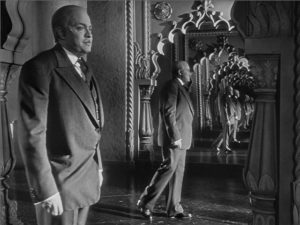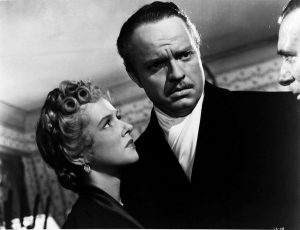Citizen Kane (1941)
- fanmovies
- November 11, 2024

Movie Review: Citizen Kane (1941)
Citizen Kane, directed by and starring Orson Welles, is widely regarded as one of the greatest films ever made. This groundbreaking drama explores themes of ambition, power, loneliness, and the elusive nature of happiness through the life of Charles Foster Kane, a wealthy newspaper tycoon whose life story is revealed through fragmented memories. The movie begins with Kane’s death, his last word being the mysterious “Rosebud,” which sparks an investigation into the meaning behind it. As a reporter delves into Kane’s past, we learn about the highs and lows of Kane’s life, uncovering the personal sacrifices he made in his pursuit of wealth and influence.
Orson Welles delivers a powerful performance as Kane, embodying the character’s charisma, complexity, and tragic flaws. Welles’s portrayal captures the youthful idealism and eventual moral decay of Kane, portraying him as both a visionary and a man deeply flawed by his own need for control. The ensemble cast, including Joseph Cotten as Kane’s loyal friend Jedediah Leland and Dorothy Comingore as his second wife Susan, enhances the emotional depth of the story, bringing authenticity to their complicated relationships with Kane.
The film’s technical achievements are legendary. Gregg Toland’s innovative cinematography introduced deep-focus shots, which allowed foreground and background elements to remain sharply in focus simultaneously. This technique, along with dramatic low-angle shots and creative use of lighting, gives Citizen Kane its distinctive, visually stunning look. The film’s use of non-linear storytelling, with each character offering different perspectives on Kane, adds layers to the narrative, making the film a rich puzzle of memories and truths that leave audiences questioning what truly defined Kane’s life.
audiences questioning what truly defined Kane’s life.
At its heart, Citizen Kane is a character study of a man who achieves immense power but never finds personal fulfillment. The film critiques the American Dream, showing that wealth and influence do not guarantee happiness or moral integrity. Kane’s obsession with material success and his failure to nurture genuine human connections make his life feel hollow despite his achievements. The enigmatic “Rosebud,” revealed in the final moments, serves as a poignant symbol of lost innocence and the childhood Kane left behind in his relentless pursuit of power.
Citizen Kane was groundbreaking in 1941 and remains influential to this day, inspiring countless filmmakers with its visual style, narrative structure, and thematic complexity. Its exploration of memory, perspective, and the cost of ambition has universal appeal, making it a timeless masterpiece that continues to resonate with audiences.
Overall, Citizen Kane is a must-watch for anyone interested in film history, storytelling, or the examination of human nature. It’s a thought-provoking exploration of a man’s life, told in a way that allows viewers to interpret his story from multiple angles, ultimately leaving the meaning of “Rosebud” and Kane’s legacy up to each viewer’s imagination











